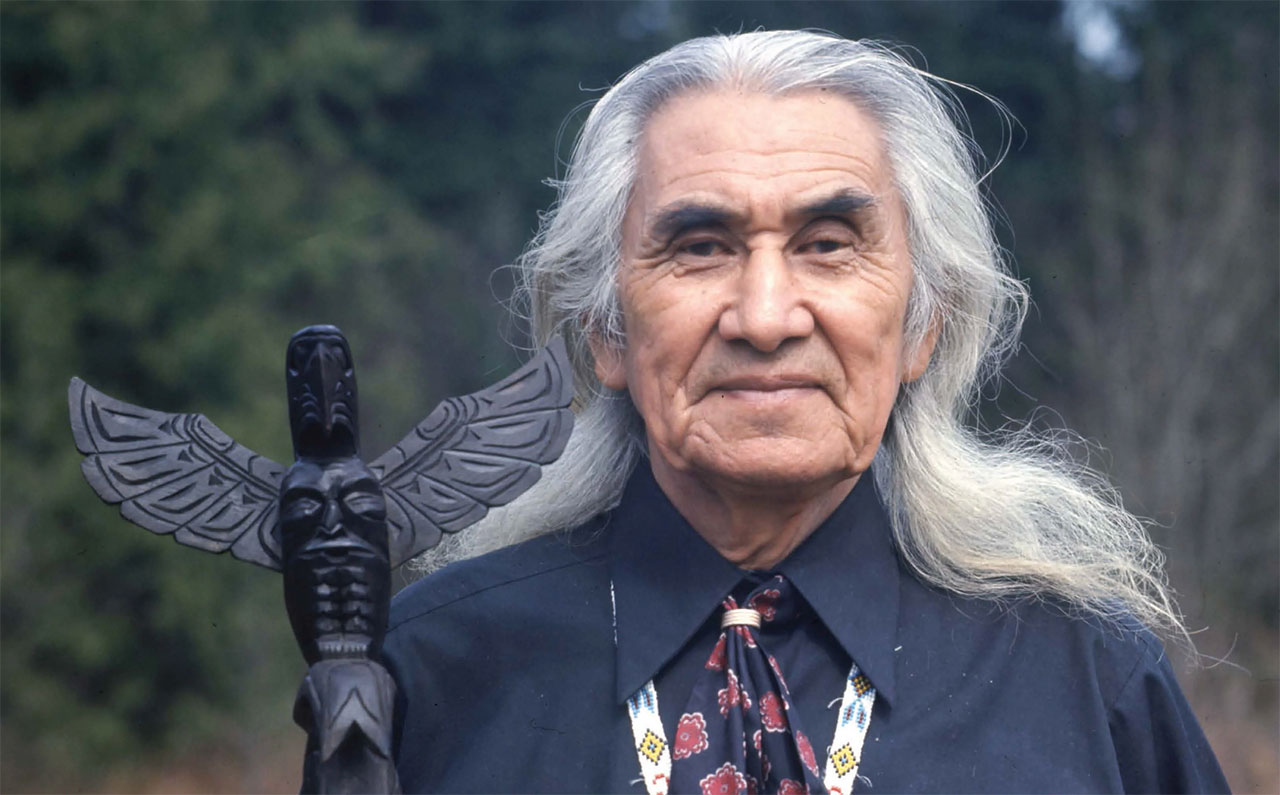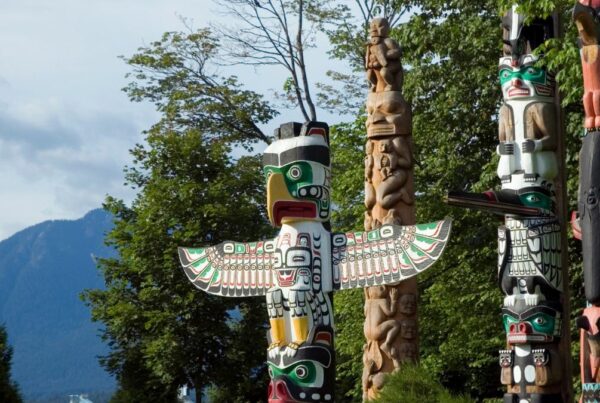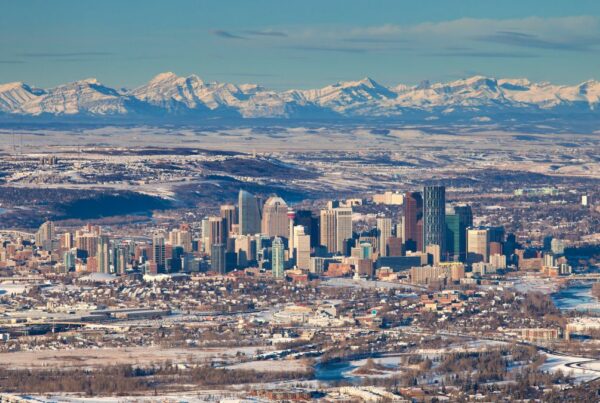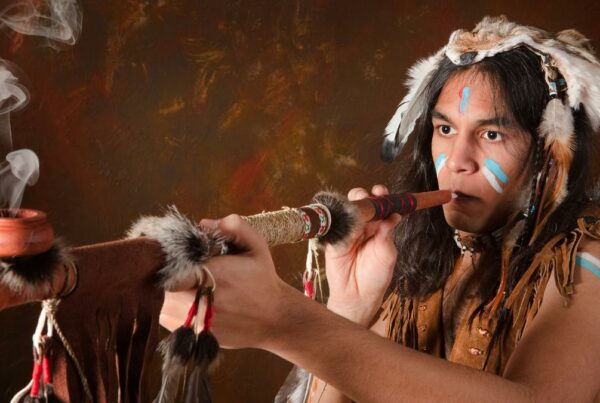There is a lot we can learn from the wisdom of Native American leaders, chiefs and teachers from both the past and from today.
As the Western culture faces a reconciliation with the indigenous cultures it has colonized, a revival of indigenous culture and the animistic worldview is spreading across the United States and the rest of the Americas.
Perhaps the saving grace of today’s culture of secular materialism and the destructiveness of industrial capitalism will be found in this reconciliation with the indigenous philosophy of life.
There were once over 500 nations of Native American tribes and today many of these tribes are growing once again and developing a new confidence in their land, history and culture.
Here are some of the most famous and influential Native American leaders that should be better known today to Canadians and Americans.
1. Oren Lyons
(1930 – Present)
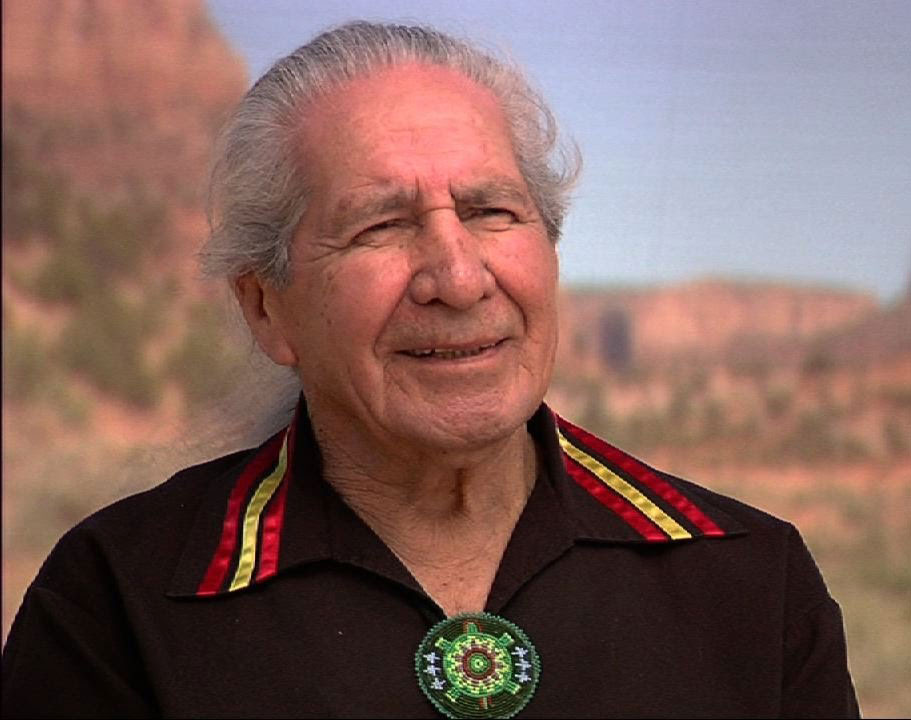
Oren R. Lyons Jr. is a Native American Faithkeeper of the Onondaga nation, which is one of the Six Nations of the historic Haudenosaunee Confederacy, which means “People of the Longhouse” (they are also referred to as the Iroquois Confederacy).
He is a passionate advocate and activist for the rights of indigenous people and has been a member of the Indigenous Peoples of the Human Rights Commission of the United Nations for 14 years.
Oren Lyons Quotes:
“We have to make a change in our direction of how we live, a change in the direction of how we think… That’s why it is important for the small voice of indigenous people at this point to come forward. Western civilization lost the mystery, you lost the elegance, you lost the spirituality of the reality of the earth and of life itself. And when you lost that, you lost direction.”
“If you do not have a moral question in your governing process, then you do not have a process that is going to survive.”
“In our perception all life is equal, and that includes the birds, animals, things that grow, things that swim. All life is equal in our perception.”
The environment isn’t over here. The environment isn’t over there. You are the environment.
“We have to do that. We have to be thankful. That’s what we said. Two things were told to us: To be thankful, so those are our ceremonies, ceremonies of thanksgiving. We built nations around it, and you can do that, too. And the other thing they said was enjoy life. That’s a rule, a law- enjoy life- you’re supposed to.”
“We’ve got to think now, in real terms, for that seventh generation . . . We’ve got to get back to spiritual law if we are to survive.”
The law says if you poison the water, you’ll die. The law says that if you poison the air, you’ll suffer. The law says if you degrade where you live, you’ll suffer. … If you don’t learn that, you can only suffer. There’s no discussion with this law.
I do not see a delegation for the four-footed. I see no seat for the eagles. We forget and we consider ourselves superior, but we are after all a mere part of the Creation. And we must continue to understand where we are. And we stand between the mountain and the ant, somewhere and there only, as part of the Creation.
Even through you and I are in different boats, you in your boat and we our canoe, we share the same river of life. What befalls me befalls you. And downstream, downstream in this river of life, our children will pay for our selfishness, for our greed, and for our lack of vision.
“When we walk upon Mother Earth, we always plant our feet carefully because we know the faces of our future generations are looking up at us from beneath the ground. We never forget them. In the absence of the sacred, nothing is sacred. Everything is for sale.”
Recommendation To Learn More About Oren Lyons:
2. John Trudell
(February 15, 1946 – December 8, 2015)
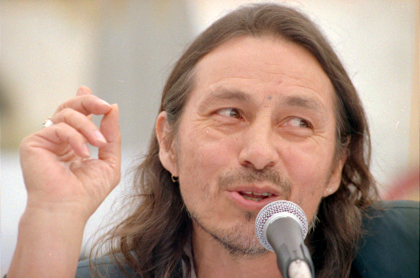
John Trudell was a Native American author, poet, actor, musician, and political activist. He was a prominent civil rights leader of the American Indian Movement.
In 1979 he lost his wife, mother-in-law and three children to a fire in their home on a reservation in Nevada, a fire which occurred just 12 hours after Trudell set an American flag on fire on the steps of the FBI building in Washington D.C.
Following the tragedy, Trudell turned his activism into poetry and music.
John Trudell Quotes:
“My goal is very simple. To communicate the human experience at a level that human beings can recognize and relate to. That may be a personal statement. It may be a political statement. But whatever it is, it all comes from the same point of reference: the experiences we share as peoples of this planet.”
“You can’t believe and think simultaneously. It’s just not going to happen. It’s a contradiction—an impossibility. Because to think means you think. To believe means that you’re not thinking, you are just believing. And your ability to think is limited by the prejudices and the definitions of your beliefs.”
“We must go beyond the arrogance of human rights. We must go beyond the ignorance of civil rights. We must step into the reality of natural rights because all of the natural world has a right to existence and we are only a small part of it. There can be no trade-off.”
“The great lie is that it is civilization. It’s not civilized. It has been literally the most blood thirsty brutalizing system ever imposed upon this planet. That is not civilization. That’s the great lie, is that it represents civilization.”
“Our bones, flesh and blood are made up of the metals, liquids and minerals of the earth and everything on this planet is made up of the same things. As humans we have being, so everything on the earth does too in our culture, because we are made of the same thing.”
“The coherency of our future depends upon us knowing who we are — and truly understanding who we are — because our relationship to reality and our relationship to power is based upon that understanding. Today we live in an industrial society and this technological perception of reality, this shadow world, presents a serious crisis: it is a reality where we don’t remember who we are, so therefore we don’t know who we are, we speak a language we don’t understand and because of this, we don’t know where we are. We are part of an evolutionary reality but part of the purpose of this technological civilization is to erase our memories and erase our identities.”
“When I go around America and I see the bulk of the white people, they do not feel oppressed. They feel powerless. When I go amongst my own people, we do not feel powerless. We feel oppressed. We do not want to make the trade. We see the physical genocide they are attempting to inflict upon our lives and we understand the psychological genocide they have already inflicted upon their own people … that this is the trade-off they want us to make for survival, that we become subservient to them, that we no longer understand our real connection to power, our real connection to the earth.”
“It’s like there’s this predator energy on this planet, and this predator energy feeds upon the essence of the spirit, feeds upon the essence of the human being, the spirit. This predator energy can take fossil fuel and other resources out of the Earth, turn it into fuel, to run a machine system. But in order for there to be a need for that system, and in order for that system to work, they have to mine our minds to get at the essence of our spirit. In the same way the external mining takes place, it pollutes—we see now, people understand how it poisons the environment, the water, the air pollution—the mining of the essence, the mining of the spirit, mining our minds … the pollution from that is all the neurotic, distorted, insecure behavior patterns that we develop. That’s the pollution. Because in order for this predatory system, this disease, to work, we must not be able to use our minds in a clear coherent manner. Because if we use our minds in a clear coherent manner, we will not accept the unacceptable.”
Recommendation To Learn More About John Trudell:
3. Russell Means
(November 10, 1939 – October 22, 2012)
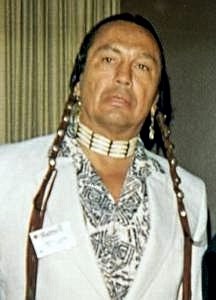
Source: Wikimedia Commons
Russell Means was a member of the Oglala Lakota nation born on the Pine Ridge Indian Reservation in South Dakota.
He was a prominent leader of the American Indian Movement and relentless political activist who dedicated his life to the fight for the rights of Native Americans.
He was originally given the name Wanbli Ohitika by his mother, which means ‘Brave Eagle’ in the Lakota language.
Russell Means Quotes:
I find freedom to be the most important issue facing any human being today, because without freedom, then life is pointless. The more dependent you become on centralized power, the more easily you are lead around.
You see the one thing I’ve always maintained is that I’m an American Indian. I’m not a Native American. I’m not politically correct. Everyone who’s born in the Western Hemisphere is a Native American. We are all Native Americans. And if you notice, I put American before my ethnicity. I’m not a hyphenated African-American or Irish-American or Jewish-American or Mexican-American.
Let me be a free man, free to travel, free to stop, free to work, free to trade where I choose, free to choose my own teachers, free to follow the religion of my fathers, free to talk, think and act for myself — and I will obey every law or submit to the penalty.
Suppose a white man should come to me and say, “Joseph, I like your horses. I want to buy them.” I say to him, “No, my horses suit me; I will not sell them.” Then he goes to my neighbor and says to him, “Joseph has some good horses. I want to buy them, but he refuses to sell.” My neighbor answers, “Pay me the money and I will sell you Joseph’s horses.” The white man returns to me and says, “Joseph, I have bought your horses and you must let me have them.” If we sold our lands to the government, this is the way they bought them.
All European tradition, Marxism included, has conspired to defy the natural order of all things. Mother Earth has been abused, the powers have been abused, and this cannot go on forever. No theory can alter that simple fact. Mother Earth will retaliate, the whole environment will retaliate, and the abusers will be eliminated. Things come full circle, back to where they started. That’s revolution.
We Indians do not teach that there is only one god. We know that everything has power, including the most inanimate, inconsequential things. Stones have power. A blade of grass has power. Trees and clouds and all our relatives in the insect and animal world have power. We believe we must respect that power by acknowledging it’s presence. By honoring the power of the spirits in that way, it becomes our power as well. It protects us.
[The is] a mistaken belief that [the word Indian] refers somehow to the country, India. When Columbus washed up on the beach in the Caribbean, he was not looking for a country called India. Europeans were calling that country Hindustan in 1492…. Columbus called the tribal people he met “Indio,” from the Italian in dio, meaning “in God.”Imagine going to the holy land in Israel, whether you’re a Christian or a Jew or a Muslim, and start carving up the mountain of Zion. It’s an insult to our entire being. It’s bad enough getting four white faces carved in up there [on Mount Rushmore], the shrine of hypocrisy.
‘Indian policy’ has now been brought down upon the American people, and the American people are the new Indians of the 21st Century.
An oral society develops both sides of your brain, and the utilization of your brain is more complete than in a linear education module. The written word limits your brain capability by immediately focusing on one area. You don’t have any peripheral vision. It immediately divorces you from the environment.
Recommendation To Learn More About Russell Means:
4. Jack D. Forbes
(January 7, 1934 – February 23, 2011)
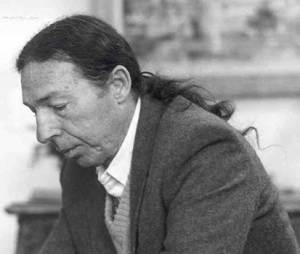
Jack D. Forbes was an American writer, scholar and political activist, who specialized in Native American issues.
In the early 1960s, Forbes became active as an organizer in the Native American movement, which asserted the rights to sovereignty and resisting assimilation into the majority culture.
His best known for his book Columbus and Other Cannibals: The Wetiko Disease of Exploitation, Imperialism, and Terrorism.
Jack D. Forbes Quotes:
“Religion is, in reality, living. Our religion is not what we profess, or what we say, or what we proclaim; our religion is what we do, what we desire, what we seek, what we dream about, what we fantasize, what we think – all these things – twenty-four hours a day. One’s religion, then, is ones life, not merely the ideal life but the life as it is actually lived.
Religion is not prayer, it is not a church, it is not theistic, it is not atheistic, it has little to do with what white people call “religion.” It is our every act. If we tromp on a bug, that is our religion; if we experiment on living animals, that is our religion; if we cheat at cards, that is our religion; if we dream of being famous, that is our religion; if we gossip maliciously, that is our religion; if we are rude and aggressive, that is our religion. All that we do, and are, is our religion.”
“The “norm” for humanity is love.
Brutality is an aberration.
We are not sinners by nature.
We learn to be bad.
We are taught to stray from our good paths.
We are made to be crazy by other people who are also crazy and who draw for us a map of the world which is ugly, negative, fearful, and crazy.”
“Imperialism creates the illusion of wealth as far as the masses are concerned. It usually serves to hide the fact that the ruling classes are gobbling up the natural resources of the home territory in an improvident manner and are otherwise utilizing the national wealth largely for their own purposes. Eventually the general public is called upon to pay for all of this, frequently after the military machine can no longer maintain external aggression.”
“I have come to the conclusion that imperialism and exploitation are forms of cannibalism and, in fact, are precisely those forms of cannibalism which are most diabolical or evil.”
Recommendation To Learn More About Jack D. Forbes:
5. Floyd Red Crow Westerman
(August 17, 1936 – December 13, 2007)
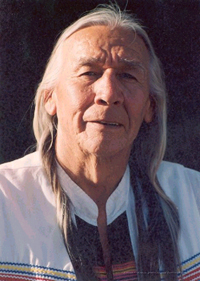
“Floyd Westerman, also known as Kanghi Duta (“Red Crow” in Dakota) was a Dakota Sioux musician, political activist, and actor.
After establishing a career as a country music singer, later in his life he became an actor, usually depicting Native American elders in American films and television.
As a political activist, he spoke and marched for Native American causes.
Floyd Red Crow Westerman Quotes:
“Everybody is so distracted by things for the self. They don’t care about their relatives anymore. The SUV shows how we feel about the environment. To turn this around, we need to go back to the earth and live with the earth spiritually.”
“There is an ancient Indian saying that something lives only as long as the last person who remembers it. My people have come to trust memory over history. Memory, like fire, is radiant and immutable while history serves only those who seek to control it, those who douse the flame of memory in order to put out the dangerous fire of truth. Beware these men for they are dangerous themselves and unwise. Their false history is written in the blood of those who might remember and of those who seek the truth.”
“Time evolves and comes to a place where it renews again. There is first a purification time, and then there is renewal time. We are getting very close to this time now…
“We were told that we would see America come and go. In a sense, America is dying, from within… because they forgot the instructions on how to live on earth.”
“Everything is coming to a time where prophecy and man’s inability to live on earth in a spiritual way, will come to a crossroad of great problems.”
“It’s the Hopi belief, it’s our belief, that, if you’re not spiritually connected to the earth, and understand the spiritual reality of how to live on earth, it’s likely you will not make it.”
“When Columbus came, that began, what we term as, the “First World War.” That was the true First World War – when Columbus arrived – because along with him came everybody from Europe.
By the end of the Second World War, we were, in America, we were only 800,000. From 60 million to 800,000. So, we were almost exterminated here in America.”
“Everything is spiritual. Everything has a spirit. Everything… everything was brought here by the Creator – the one Creator. Some people call Him “God,” some people call Him “Buddha,” some people call Him “Allah,” some people call Him other names. We call Him “Concachilla”… “Grandfather.”
“We’re here on earth… only a few winters. Then, we go to the Spirit World. The Spirit World is more real than most of us believe. The Spirit World is everything.”
“Over 95% of our body is water. And, in order to stay healthy, you’ve got to drink good water. When the European first came here, Columbus, we could drink out of any river. If the Europeans had lived the Indian way when they came, we would still be drinking out of rivers, because Water is sacred. The Air is sacred.”
“Our DNA is made of the same DNA as the tree. The tree breathes what we exhale. When the tree exhales, we need what the tree exhales. So, we have a common destiny with the tree. We are all from the earth. And when earth, water and the atmosphere is corrupted, then it will create its own reaction. Our Mother is reacting.”
“In the Hopi prophecy they say the storms and floods will become greater. To me, it’s not a negative thing to know that there will be great changes. It’s not negative, it’s evolution. When you look at it as evolution, it’s time. Nothing stays the same.”
“You should treat all things as Spirit – realize that we are ONE Family. It’s never something like “the End.” It’s like Life – there is no end to Life.”
Recommendation To Learn More:
6. Chief Dan George
(July 24, 1899 – September 23, 1981)
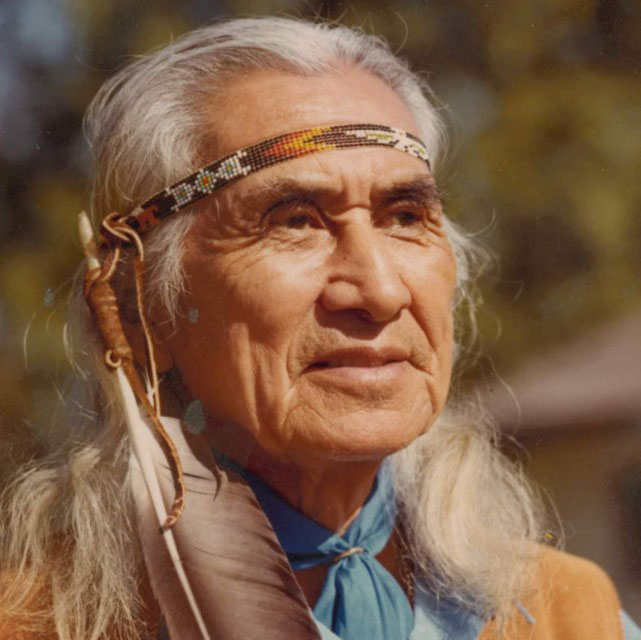
Chief Dan George was an actor, musician, poet, author, activist and the chief of the Tsleil-Waututh Nation, a Coast Salish band whose Indian reserve is located on Burrard Inlet in North Vancouver,
His best-known written work were My Heart Soars and My Spirit Soars, which were combined together in the best-selling book The Best of Chief Dan George
“As an actor, he is best remembered for portraying Old Lodge Skins opposite Dustin Hoffman in Little Big Man (1970), for which he was nominated for the Academy Award for Best Supporting Actor; also for his role in The Outlaw Josey Wales (1976), as Lone Watie, opposite Clint Eastwood.”
The Best of Chief Dan George [Book]
Chief Dan George Quotes:
One thing to remember is to talk to the animals. If you do, they will talk back to you. But if you don’t talk to the animals, they won’t talk back to you, then you won’t understand, and when you don’t understand you will fear, and when you fear you will destroy the animals, and if you destroy the animals, you will destroy yourself.
The beauty of the trees, the softness of the air, the fragrance of the grass, they speak to me. The summit of the mountain, the thunder of the sky, the rhythm of the sea, speaks to me. The faintness of the stars, the freshness of the morning, the dewdrop on the flower, speaks to me. The strength of the fire, the taste of the salmon, the trail of the sun, and the life that never goes away, they speak to me. And my heart soars.
There is a longing among all people and creatures to have a sense of purpose and worth. To satisfy that common longing in all of us we must respect each other.
Love is something you and I must have. We must have it because our spirit feeds upon it. We must have it because without it we become weak and faint. Without love our self-esteem weakens. Without it our courage fails. Without love we can no longer look out confidently at the world.
First we had the land and they had the Bibles, now we have the Bibles and they have the land.
The heart never knows the colour of the skin.
Of all the teachings we receive, this one is most important: Nothing belongs to you of what there is, of what you take, you must share.
Can we talk of integration until there is integration of hearts and minds? Unless you have this, you only have a physical presence, and the walls between us are as high as the mountain range.
We are as much alive as we keep the Earth alive.
Recommendation To Learn More About Chief Dan George:
7. Nicholas Black Elk
(December 1, 1863 – August 19, 1950)
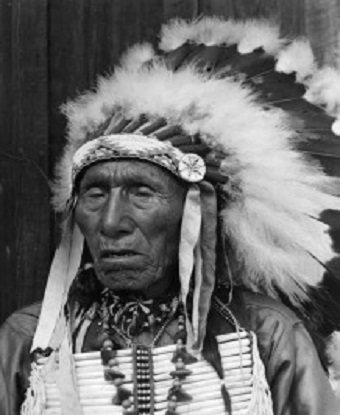
“Black Elk was a Oglala Lakota visionary, healer, educator and leader. He was a second cousin of the war leader Crazy Horse and fought with him in the Battle of Little Bighorn and he also survived the Wounded Knee Massacre in 1890.
He was best known for relating his religious views, visions, and events from his life to poet John Neihardt. Neihardt published these in his book Black Elk Speaks in 1932 and near the end of his life, he recorded the seven sacred rites of the Sioux to ethnologist Joseph Epes Brown which were published in 1947 in the book The Sacred Pipe.
Black Elk Speaks: The Complete Edition [Book]
Black Elk Quotes:
The first peace, which is the most important,
is that which comes within the souls of people
when they realize their relationship,
their oneness with the universe and all its powers,
and when they realize that at the center of the universe
dwells the Great Spirit,
and that this center is really everywhere,
it is within each of us.
Let every step you take upon the earth be as a prayer.
All things are our relatives; what we do to everything, we do to ourselves. All is really One.
The Universe is circles within circles, and everything is one circle, and all the circles are connected to each other. Each family is a circle, and those family circles connect together and make a community, and the community makes its circle where it lives on the Earth. It (the community) cares for that part (of the Earth) but cares for it as a circle – which is to say in a cooperative and egalitarian way, where everybody is cared for, and everybody is respected.
I was standing on the highest mountain of them all, and round about beneath me was the whole hoop of the world. And while I stood there I saw more than I can tell and I understood more than I saw; for I was seeing in a sacred manner the shapes of all things in the spirit, and the shape of all shapes as they must live together like one being. And I saw that the sacred hoop of my people was one of many hoops that made one circle, wide as daylight and as starlight, and in the center grew one mighty flowering tree to shelter all children of one mother and one father. And I saw that it was holy.
We should understand well that all things are the work of the Great Spirit. We should know the Great Spirit is within all things: the trees, the grasses, the rivers, the mountains, and the four-legged and winged peoples; and even more important, we should understand that the Great Spirit is also above all these things and peoples. When we do understand all this deeply in our hearts, then we will fear, and love, and know the Great Spirit, and then we will be and act and live as the Spirit intends.
Grown men may learn from very little children, for the hearts of little children are pure, and, therefore, the Great Spirit may show to them many things which older people miss.
At the center of the universe dwells the Great Spirit. And that center is really everywhere. It is within each of us.
“You have noticed that everything as Indian does is in a circle, and that is because the Power
of the World always works in circles, and everything tries to be round. The sky is round, and I
have heard that the earth is round like a ball, and so are all the stars. The wind, in its greatest
power, whirls. Birds make their nest in circles, for theirs is the same religion as ours. Even the
seasons form a great circle in their changing, and always come back again to where they were.
The life of a man is a circle from childhood to childhood, and so it is in everything where power
moves.”
“Crazy Horse dreamed and went into the world where there is nothing but the spirits of all things. That is the real world that is behind this one, and everything we see here is something like a shadow from that one.”
“You have noticed that the truth comes into this world with two faces. One is sad with suffering, and the other laughs; but it is the same face, laughing or weeping. When people are already in despair, maybe the laughing face is better for them; and when they feel too good and are too sure of being safe, maybe the weeping face is better for them to see.”
“Anyone who is attached to things of this world is one who lives in ignorance and is being consumed by the snakes of his own passions. The holy land is everywhere.”
Recommendation To Learn More About Black Elk:
8. Sitting Bull
(1831 – December 15, 1890)
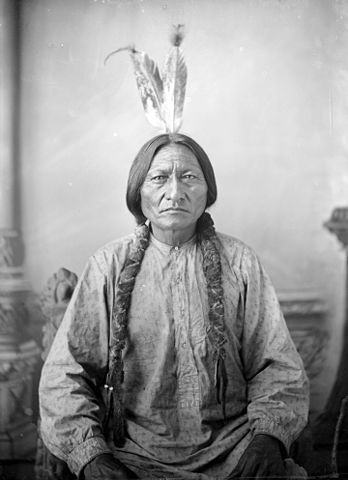
“Sitting Bull was a Hunkpapa Lakota leader who led his people in resistance against United States government policies.
He was killed by Indian agency police on the Standing Rock Indian Reservation during an attempt to arrest him, at a time when authorities feared that he would join the Ghost Dance movement.”
Sitting Bull Quotes:
Inside of me there are two dogs. One is mean and evil and the other is good and they fight each other all the time. When asked which one wins I answer, the one I feed the most.
For us, warriors are not what you think of as warriors. The warrior is not someone who fights, because no one has the right to take another life. The warrior, for us, is one who sacrifices himself for the good of others. His task is to take care of the elderly, the defenseless, those who can not provide for themselves, and above all, the children, the future of humanity.
The life my people want is a life of freedom. I have seen nothing that a white man has, houses or railways or clothing or food, that is as good as the right to move in the open country and live in our fashion.
Our religion seems foolish to you, but so does yours to me. The Baptists and Methodists and Presbyterians and the Catholics all have a different God. Why cannot we have one of our own?
What treaty that the whites have kept has the red man broken? Not one. What treaty that the white man ever made with us have they kept? Not one.
“Hear me people: We have now to deal with another race – small and feeble when our fathers first met them, but now great and overbearing. Strangely enough, they have a mind to till the soil and the love of possession is a disease with them. These people have made many rules that the rich may break but the poor may not. They take their tithes from the poor and weak to support the rich and those who rule.”
Recommendation To Learn More About Sitting Bull:
9. Chief Joseph
(March 3, 1840 – September 21, 1904)
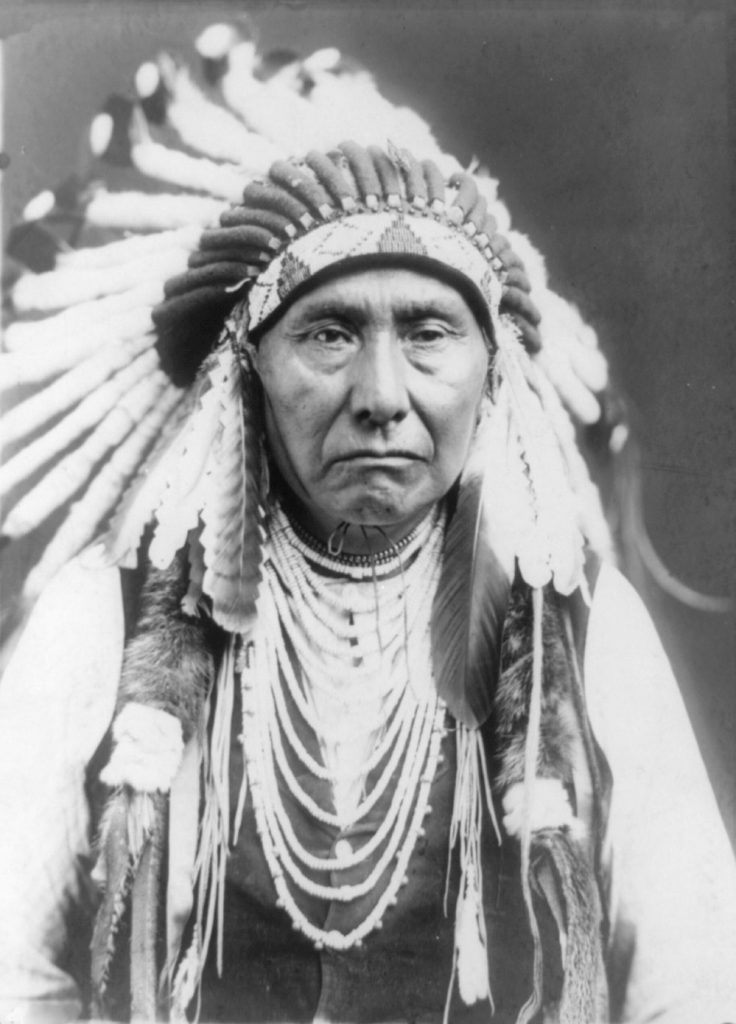
Chief Joseph was a leader of the Wal-lam-wat-kain (Wallowa) band of Nez Perce, a Native American tribe of the interior Pacific Northwest region of the United States in the latter half of the 19th century.
During this leadership, the Nez Perce were forcibly removed by the United States federal government from their ancestral lands in the Wallowa Valley of northeastern Oregon onto a significantly reduced reservation in the Idaho Territory.
Chief Joseph’s life remains iconic of the fierce resistance of the American Indian Wars. For his passionate, principled resistance to his tribe’s forced removal, he became renowned as a humanitarian and peacemaker.
Chief Joseph Quotes:
“I believe much trouble would be saved if we opened our hearts more.”
“It does not require many words to speak the truth.”
“The eye tells what the tongue would hide.”
“The earth is the mother of all people, and all people should have equal rights upon it.”
“We do not want churches because they will teach us to quarrel about God. We do not want to learn that. We may quarrel with men sometimes about things on this earth, but we never quarrel about the Great Spirit. We do not want to learn that.”
“If the white man wants to live in peace with the Indian, he can live in peace. Treat all men alike. Give them all the same law. Give them all an even chance to live and grow. All men were made by the same Great Spirit Chief. They are all brothers. The Earth is the mother of all people, and all people should have equal rights upon it. Let me be a free man, free to travel, free to stop, free to work, free to trade where I choose, free to choose my own teachers, free to follow the religion of my fathers, free to think and talk and act for myself, and I will obey every law, or submit to the penalty.”
“We live, we die, and like the grass and trees, renew ourselves from the soft earth of the grave. Stones crumble and decay, faiths grow old and they are forgotten, but new beliefs are born. The faith of the villages is dust now… but it will grow again… like the trees.”
“We were taught to believe that the Great Spirit sees and hears everything, and that he never forgets; that hereafter he will give every man a spirit-home according to his deserts: if he has been a good man, he will have a good home; if he has been a bad man, he will have a bad home. This I believe, and all my people believe the same.”
Recommendation To Learn More About Chief Joseph:
10. Luther Standing Bear
(December 1868 – February 20, 1939)
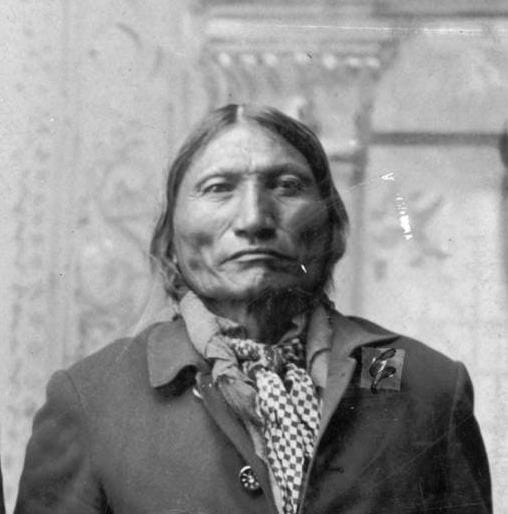
Luther Standing Bear was a Sicangu and Oglala Lakota chief notable in American history as a Native American author, educator, philosopher and actor.
He was one of a small group of Lakota leaders of his generation who were born and raised in the oral traditions of their culture, educated in white culture, and wrote significant historical accounts in English of their people and history.
Standing Bear helped create the popular twentieth-century image that Native American culture is holistic and respectful of nature. His words constitute an enduring legacy of Native American wisdom.
Luther Standing Bear Quotes:
“Knowledge was inherent in all things. The world was a library.
Training began with children who were taught to sit still and enjoy it. They were taught to use their organs of smell, to look where there was apparently nothing to see, and to listen intently when all seemingly was quiet. A child who cannot sit still is a half-developed child.”
“The old Lakota was wise. He knew that man’s heart, away from nature, becomes hard; he knew that lack of respect for growing, living things soon led to lack of respect for humans too.”
“Only to the white man was nature a “wilderness” and only to him was the land “infested” with “wild” animals and “savage” people. To us it was tame. Earth was bountiful and we were surrounded with the blessings of the Great Mystery. Not until the hairy man from the east came and with brutal frenzy heaped injustices upon us and the families that we loved was it “wild” for us. When the very animals of the forest began fleeing from his approach, then it was that for us the “Wild West” began.”
“We did not think of the great open plains, the beautiful rolling hills, and the winding streams with tangled growth as “wild”. Only to the White man was nature a “wilderness” and only to him was the land infested by “wild” animals and “savage” people. To us it was tame. Earth was bountiful and we were surrounded with the blessings of the Great Mystery. Not until the hairy man from the east came and with brutal frenzy heaped injustices upon us and the families we loved was it “wild” for us. When the very animals of the forest began fleeing; from his approach, then it was that for us the “wild west” began.”
“White men seem to have difficulty in realizing that people who live differently from themselves still might be traveling the upward and progressive road of life.”
“The old people came literally to love the soil and they sat or reclined on the ground with a feeling of being close to a mothering power. It was good for the skin to touch the earth and the old people liked to remove their moccasins and walk with bare feet on the sacred earth. Their tipis were built upon the earth and their altars were made of earth. The birds that flew into the air came to rest upon the earth and it was the final abiding place of all things that lived and grew. The soil was soothing, strengthening, cleansing and healing.”
“Kinship with all creatures of the earth, sky and water was a real and active principle. In the animal and bird world there existed a brotherly feeling that kept the Lakota safe among them. And so close did some of the Lakotas come to their feathered and furred friends that in true brotherhood they spoke a common tongue.”
“Today the children of our public schools are taught more of the history, heroes, legends, and sagas of the old world than of the land of their birth, while they are furnished with little material on the people and institutions that are truly American.”
Recommendation To Learn More About Luther Standing Bear:
- Reconnect To Your Original Nature Through Awe And Wonder - April 17, 2024
- Pasqueflower: A Spring Wildflower That Symbolizes Rebirth - April 5, 2024
- Deep Embodiment And The Flow of Embodied Awareness - April 1, 2024
